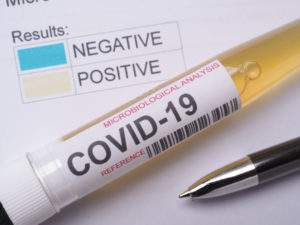
The authors point to the relative importance of minimizing false negative tests because, while false positive test results lead to unnecessary quarantine measures and contact tracing, false negative test results can be more damaging because they misinform infected people who can then unknowingly spread the virus. Based on this reality, the U.S. Food and Drug Administration (FDA) has granted commercial test manufacturers the Emergency Use Authorizations (EUAs) to facilitate COVID-19 test validation for reverse transcriptase polymerase chain reaction (RT-PCR) tests, which are the tests that are deployed to identify current infection (versus previous infection, which is analyzed with an antibody test).
Validation measures aim to determine test sensitivity, or the likelihood that an infected sample will indeed produce a positive test result, as well as test specificity – i.e. the likelihood that a sample that is not infected will produce a negative test result. According to the authors, test sensitivity, which they argue is the more important measure, may only reach about 70%. In other words, 30% of people who take a test and who are infected will get a negative test result. The authors claim that this level of false negative tests needs to be lowered and point to strategies to help improve our ability to accurately diagnose people who have been infected with the virus causing COVID-19. By improving our ability to rapidly identify those who are infected, the hope is that we can more effectively stop the spread.
Reference
Woloshin S, Patel N, Kesselheim AS. False Negative Tests for SARS-CoV-2 Infection – Challenges and Implications. N Engl J Med. June 2020. doi:10.1056/NEJMp2015897
